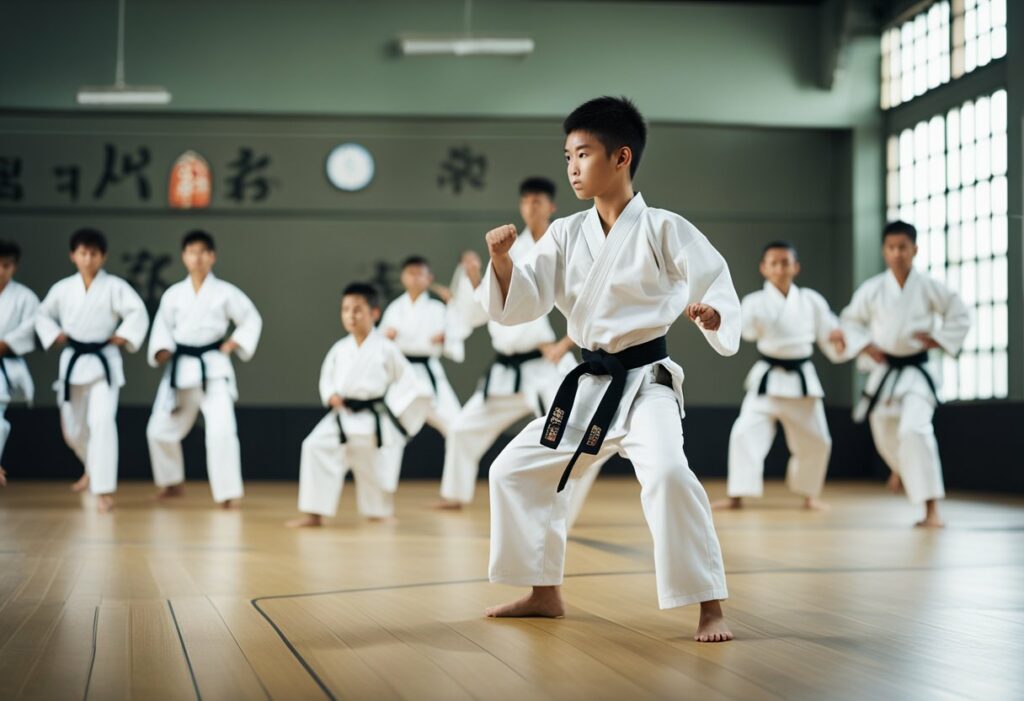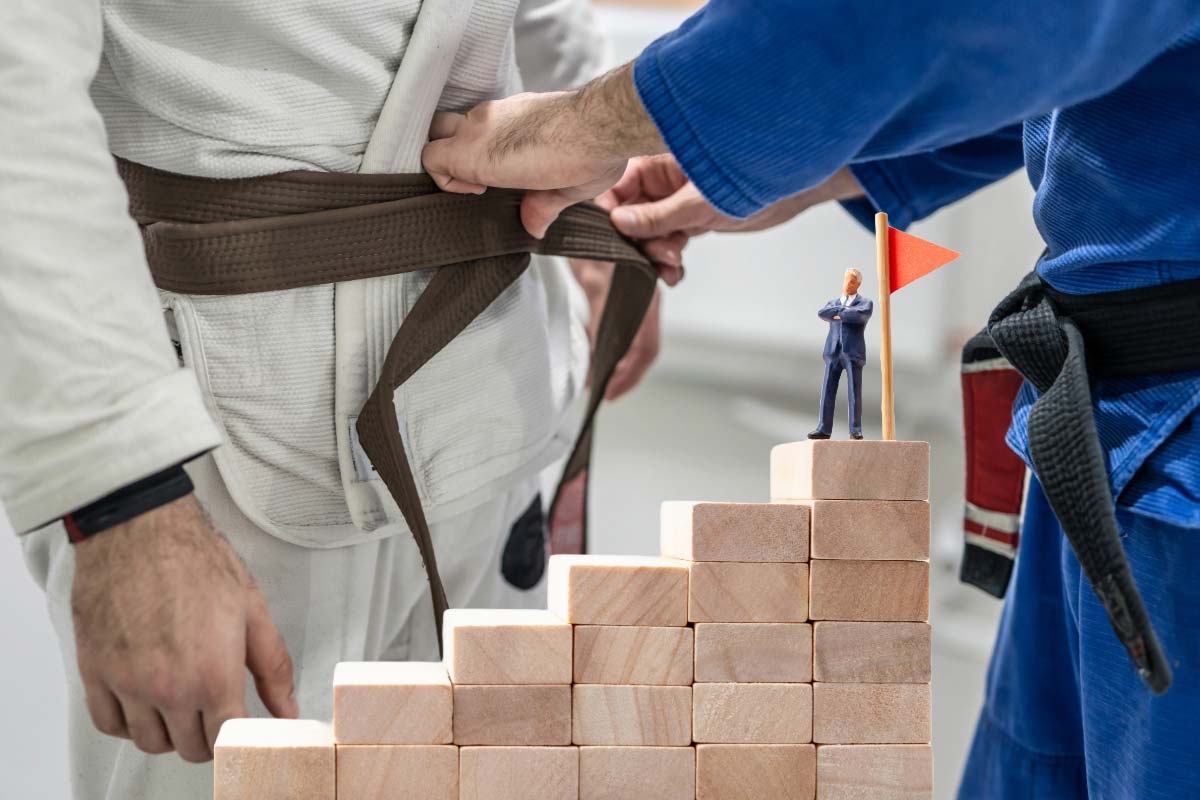The kaizen philosophy is all about continuous improvement.
While originally develop in the manufacturing industry, it’s not just for business. Kaizen is a powerful tool for personal development in martial arts and beyond.
By taking small, deliberate steps, you can cultivate discipline, skill, and a mindset geared towards steady growth and progress.
Let’s explore how embracing kaizen can lead to mastery in both the dojo and daily life.
This article covers:
Kaizen Philosophy Origins and Principles
The Kaizen philosophy centers on continuous improvement through small, incremental changes. Initially rooted in Japanese culture, it has become a global concept influencing various aspects of life, including martial arts.
The History of Kaizen
Kaizen is a Japanese term meaning “change for the better” or “continuous improvement”, and it plays a significant role in Japanese life, intertwining with cultural practices like Shinto.
The philosophy took on a structured form post-World War II as Japan rebuilt its economy. Toyota adopted Kaizen to improve efficiency and productivity, resulting in the development of the Toyota Production System (TPS), which became a model for industries worldwide.
This approach to incremental change proved pivotal in Japan’s rapid post-war recovery and subsequent economic growth.
Core Kaizen Principles
Kaizen embraces several principles that facilitate consistent improvement. First, “kai” (change) is combined with “zen” (good) to focus on ongoing, positive transformation.
The philosophy also promotes the 5S framework: Sort, Set in order, Shine, Standardize, and Sustain, which helps organizations maintain a productive and efficient work environment.
This framework is often associated with the Kaizen philosophy of continuous improvement because it provides a foundational structure for creating and maintaining an efficient and productive work environment.

Here’s the basic 5s framework:
- Sort: Eliminate unnecessary items from the space to reduce clutter and distractions.
- Set in order: Organize and arrange training gear and resources for easy access and efficient workflow.
- Shine: Clean the environment and equipment to maintain a tidy and safe workspace.
- Standardize: Implement consistent routines and protocols to maintain organization and cleanliness.
- Sustain: Continuously uphold and practice the established standards over time.
Kaizen encourages employee involvement at all levels and emphasizes that every staff member has a role in process refinement. It inspires a culture where achieving mastery in martial arts, work, or personal life becomes possible through persistent, small enhancements.
Kaizen in Personal Development
Kaizen, the Japanese philosophy of continuous improvement, has profound implications for personal development. It encourages the pursuit of progress through incremental steps, ensuring steady advancement towards one’s goals.
Even Tony Robbins, one of the most influential motivation and transformation coaches in the world, preaches the importance of gradual change and forming habits.
In his 2024 Time to Rise Summit, he teaches the 7 steps to “the path” which emphasizes the integration of small, daily actions into your life to guarantee long-term success.
Building Efficient Habits
Kaizen teaches that incremental change is the key to forming efficient habits. One begins by identifying a small, manageable habit linked to a larger personal development goal. They then incorporate this habit into their daily routine, allowing it to become a natural part of their life.
For instance, someone aiming to improve their physical health might start by drinking one extra glass of water each day.
Over time, this small step can evolve into a consistent hydration practice, ultimately contributing to overall well-being and happiness.
To solidify a new habit, tracking progress is essential. A simple table can help visualize this:
| Week | Goal | Outcome |
|---|---|---|
| 1 | 1 extra glass | Achieved |
| 2 | 2 extra glasses | Achieved |
| 3 | 3 extra glasses | Partially met |
| 4 | 3 extra glasses | Achieved |
As the table shows, gradual increases support habit formation without overwhelming the individual. Progress moves at a sustainable pace which allows you to more naturally implement positive behaviors into your life.
Kaizen for Personal Growth
In personal growth, Kaizen focuses on setting achievable goals that foster continuous improvement. Small steps accumulate to significant change, alleviating the pressure that can accompany more extensive, daunting objectives.
For example, if one aspires to read more books, they might start with a schedule of reading for just 10 minutes each night. This small commitment is scalable and can grow as they become more accustomed to the routine. After enough time, reading for 30 minutes every day becomes a no-brainer.
Paying attention to detail in these initial stages prevents the development of bad habits. Regular reflection on successes and areas for improvement is a vital aspect of personal growth. An individual may use a checklist to ensure they stay on course:
Example checklist to start reading more as a goal:
- Establish small, daily reading goals (eg. Read 20 minutes or 10 pages).
- Reflect weekly on the reading experience (eg. Maybe you realized 20 minutes is too short. Perhaps, you went over and ended up reading for 30 minutes!).
- Increase reading time gradually (eg. Read one book per month).
By adhering to the tenets of Kaizen, individuals can avoid plateaus and continue advancing towards greater improvement and fulfillment.
Implementing Kaizen in Martial Arts

The integration of Kaizen into martial arts training emphasizes gradual progression and consistent discipline. Adopting this philosophy encourages learners to focus on small, manageable improvements.
Mastery Through Small Steps
In martial arts, the Kaizen philosophy is implemented by breaking down complex techniques into smaller, more manageable components.
For a martial arts practitioner, this might look like focusing on a single kick or block and improving it incrementally.
For instance, here’s a simple schedule to breakdown improving your technique:
- Week 1: Concentrate on your fight stance and balance.
- Week 2: Work on the precision of the kick.
- Week 3: Increase the strength of the block.
- Week 4: Practice flowing into the next move.
This structured approach ensures that martial artists progress steadily without becoming overwhelmed. While the length of training may stretch over a longer time horizon, this simple schedule is very manageable and ensures progress.
Discipline and Continuous Improvement
Continuous improvement in martial arts requires strict adherence to discipline. A Kaizen-inspired practitioner might keep a training journal to track progress and set mini-goals. Here’s an example of what that might include:
- Daily Objectives: Each session should have a clear focus, such as refining footwork or enhancing speed. If you’re a jijujitsu practitioner for example, perhaps, focus on sweeps or escapes from bad positions, etc.
- Feedback: Regular instructor and partner feedback ensures corrections are made and can be implemented promptly.
- Self-Reflection: Personal assessments after each class to identify areas for further improvement.
This strategy cultivates a beginner’s mindset, where there is always something new to learn, no matter the level of expertise.
Examples of Kaizen in Training
There are numerous examples of Kaizen principles at play in martial arts training:
- Belt System: Incremental advancement through belt ranks epitomizes small step progression.
- Technique Refinement: A white belt doesn’t perform the same move as a black belt; they refine the movement as they progress.
- Efficiency: Practitioners learn to perform techniques with more efficiency, less effort, and increased effectiveness over time.
By methodically approaching training with these examples, martial artists embody Kaizen, turning small steps into significant mastery over time.
Have you implemented the Kaizen principles into your personal growth? Do you subscribe to any philosophy or frameworks that have impacted your development? Leave a comment below.







